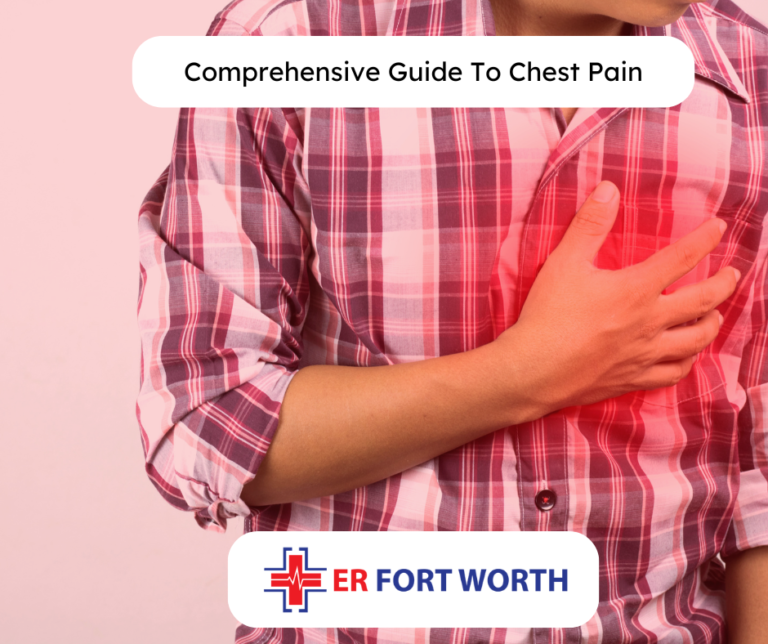Comprehensive Guide to Chest Pain: Causes and When to Seek Emergency Care
Chest pain can be a frightening experience and a potential indicator of heart issues. It can manifest in various forms and intensities, ranging from a dull ache to a sudden, sharp stab. Some people experience a heavy pressure on their chest, while others feel a burning sensation. In some cases, the pain can radiate to the neck, towards the jaw, arms, and back.
There are many potential causes of chest discomfort, with the most critical ones involving the heart and lungs. Understanding these various causes and symptoms is crucial for knowing when to seek emergency care.
In this guide, we’ll help you identify the different types of chest pain and provide insight on when to seek urgent medical attention.
| Disclaimer: The content provided in this guide is for informational purposes only. It’s not a substitute for professional medical advice, diagnosis, or treatment. In case of severe discomfort, always consult our ER facility. |
Symptoms of Chest Pain
Chest pain is often linked to heart-related issues, but there are a few other conditions that can cause discomfort in the chest area. Some of these underlying causes include:
- Pressure, squeezing, or tightness in the chest
- Sharp, stabbing pain
- Heaviness in chest
- Shortness of breath
- Nausea or vomiting
- Cold sweat
- Dizziness or lightheadedness
- Pain radiating to the shoulders, arms, jaw, neck, or back
It’s important to note that not every Chest discomfort signifies a heart attack. It could be one of the various reasons but not the only reason.
If you’ve a history of heart disease or chest pain and experience worsening symptoms, seek emergency care. Timely diagnosis and treatment are crucial, as chest discomfort can also indicate a life-threatening condition.
Causes of Chest Pain
Chest pain can arise from a wide range of causes, some more common and benign, while others are rare but potentially serious. It’s crucial to understand these potential causes to determine the appropriate course of action.
Heart-related causes
Heart-related conditions are among the most concerning causes of chest pain. Here are some common examples:
Angina
Angina is a type of chest discomfort that occurs when the heart muscle doesn’t get enough oxygenated blood. It usually starts behind the breastbone but can spread to shoulders, arms, neck, jaw, abdomen, back, and throat. Possible triggers include:
- Physical activity
- Emotional stress
- Extreme temperatures
- Heavy meals
- Smoking
- Drinking alcohol
Aortic Dissection
An aortic dissection is a life-threatening condition in which the inner layers of the aorta (the main artery carrying blood from the heart) split. This allows the blood to flow between layers and can damage the aorta.
Heart Attack
A heart attack happens when blood flow to a part of the heart gets blocked, often by a blood clot in a coronary artery. This blockage prevents oxygen from reaching the heart muscle, which can damage the muscle cells if blood flow isn’t restored quickly.
Pericarditis
Pericarditis is the inflammation of the pericardium, which is the protective sac surrounding the heart. The condition causes severe chest pain that worsens with breathing or lying down.
Other Causes of Chest Pain
While heart-related issues are common, chest pain can also originate from other sources. Some of these include:
- Digestive issues such as acid reflux or gallbladder problems
- Respiratory problems like asthma or pneumonia
- Pancreatic disorders
- Swallowing disorders
Chest Pain Relief Methods
Effectively relieving chest pain depends on accurately identifying its underlying cause. Although it might not be a sign of a heart attack, healthcare professionals will prioritize ruling out life-threatening conditions like blood clots in the lung or lung collapse.
The Immediate Diagnosis Tests
Our healthcare professionals at Fort Worth ER may order one or more of the following tests to pinpoint the cause of your chest pain.
Electrocardiogram (ECG or EKG)
The ECG test measures your heart’s electrical activity and detects whether your heart is beating too quickly or too slowly. The test can also indicate if a person had or is having a heart attack.
Blood Tests
Blood tests indicate many medical conditions that a patient might experience after a heart attack. Some proteins slowly leak into the bloodstream after the attack, and blood tests can detect these proteins and assess heart muscle damage.
Digital X-Ray
If our doctors rule out heart issues, they may perform an x-rays to diagnose lung conditions, such as pneumonia or a collapsed lung. These X-rays also provide information about the heart (e.g. its shape and size) and some major blood vessels.
Computerized Tomography (CT) Scan
CT scans offer detailed imaging of the body and can identify various chest problems, including aortic dissection and other chest conditions.
Based on the findings of these tests, our doctors may conduct further diagnostic procedures to determine the appropriate course of treatment.
When To Seek Emergency Care for Chest Pain?
Chest pain shouldn’t be ignored, regardless of your overall health and fitness level. It can be a symptom of various underlying conditions, ranging from heart issues to lung disorders, and requires immediate medical care.
Seek our emergency care service at Fort Worth, Tx, if you or your loved one experience symptoms like sharp pain, heaviness in chest, breathing difficulties, irregular heartbeat, and discomfort radiating to other areas like the arms or jaw. While your Chest discomfort may not signify a life-threatening emergency, it’s important to consult an expert for an accurate diagnosis and appropriate treatment.
Remember, timely intervention can help manage the underlying condition and prevent further complications.
FAQs
What is the ICD-10 code for chest pain?
The ICD-10 code for chest pain is R07.9. The International Classification of Diseases, Tenth Revision, or ICD-10, is a medical coding system designed by the WHO to classify and code diagnosis, symptoms, and procedures.
What causes chest pain?
Chest pain may be caused by heart conditions such as angina or heart attack, and lung disorders like pneumonia or pulmonary embolism. Moreover, digestive issues like acid reflux or gallbladder problems and muscle strain can also cause pain in the chest.
Can anxiety cause chest pain?
Yes, anxiety can cause chest discomfort. Increased stress and anxiety lead to rapid breathing and muscle tension, which can cause tightness in the chest area. Panic attacks can also trigger chest pain.
Will high cholesterol lead to chest pain?
High cholesterol is one of the biggest reasons for chest pain because it promotes the buildup of plaque in arteries. This condition narrows the arteries which restricts blood flow and causes chest pain.




